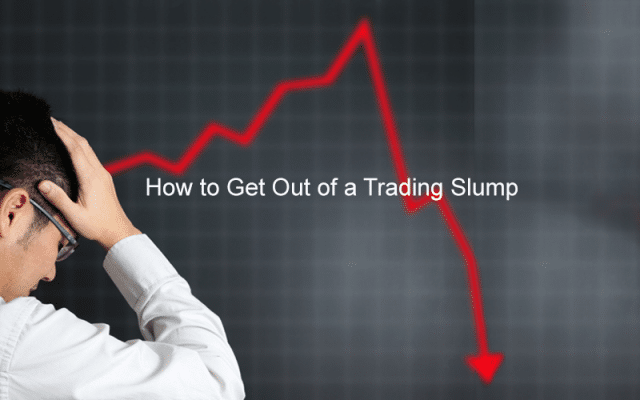Going through a significant trading slump can be a gut-wrenching experience for traders. Some professional speculators say, that it is a clear test of how good you are. No matter how many losing streaks one goes through, each slump brings with it the same negative feelings. The typical symptoms of a trading slump can include self-hate, self-doubt, frustration, a lump in the throat, physical nausea, sadness, confusion, and other negative feelings, and unconfidence.
One can never quite expect when a slump can begin, particularly in the forex market. The first thing to understand here is that it involves probabilities. For instance, a trader with 55% of winning days will nevertheless, experience two or three 5-day losing streaks per year on average. Slumps can be dangerous because it can morph from a simple good decision/bad outcome scenario into something more nefarious.
Self-awareness is the first step to deal with slumps. Traders should recognize physical signs of frustration and distress, acknowledge them, and try to deal with them. The worst thing one can do is be in denial. Once a trader realizes that he/she is in a slump, they should first, slow down. Cutting their positions down dramatically or taking a couple of days off is a good thing to do. For instance, if a trader usually trades with positions worth $100 million, he/she should cut it down to $20 million. They should drop down to $10 million if they lose money any further.
Why shouldn’t a trader stop trading completely?
Traders shouldn’t stop trading, but the decision ultimately depends on personal preference. Instead of stopping completely, traders can take one or two days off to rest mentally and then start trading smaller in size. There is a rhythm in short-term trading that can easily be lost if one stops trading. Instead, traders should cut down their positions to something small enough so that it wouldn’t matter if they’re wrong or right. The primary objective in this phase should be to reset one’s emotions while maintaining a connection to the market, rather than to make money.
Many speculators can take a step back and stop trading altogether when they experience a nasty losing streak. However, they should utilize that time for research or back-testing. There are some traders who like to completely disconnect themselves from the market. Ray Dalio says, that not participating in the market lets your emotional capital grow. However, according to Jared Dillian, the markets are like a story. One can’t merely flip ahead ten pages to see what’s going on.
Taking scheduled time off when one experiences trading slumps is necessary, and vacations are a critical part of a healthy trading process. The human brain is not capable of processing billions of bits of market information efficiently for all 52 weeks in a year.
Taking 3 or 4 days off from the market is enough for one to clear their brain, allowing them to come back fresh. One can achieve this only by going on vacation and staying flat, not thinking about the market. It is recommended that a trader goes on vacation at least once a year.
An experienced trader will know when the slump gets over, and things seem easier again. A losing trade would not produce negative emotions or a physical reaction anymore. They should try to return to their usual trading size back.
There is, however, a different type of slump which is precipitated by concrete externality rather than just a run of bad luck. In other words, it is triggered by forces outside the market and not by random variance. This could be the trader’s health, mental well-being, an addiction, financial security, or something of that nature. When traders face such a situation, they should immediately get away from the market and figure out things before returning.
Traders should note that trading isn’t an escape. If they have any outstanding issues to deal with, they should resolve it first before coming back. The lingering questions might interrupt their train of thought in front of the terminal. Trading is stressful enough as it is, and one wrong move due to a negative emotion related to an external event could lead to substantial losses. Traders should take some time off, preferably the whole day, when they face such situations.
Tips to Handle Slumps
- Squaring Up: Traders should cut any existing positions they have immediately. It is useful for dissipating any residual frustration that the trader might have related to any losing trades.
- Trade Smaller: Traders should cut their positions for new ideas to about 20% of their typical day’s trades. Rather than just disconnecting for the market and coming back, traders should trade small and wait for a five-star idea to reengage fully. However, one should stop immediately if they get frustrated or if their state of mind is weak.
- Talking about the Slump: Sometimes, discussing one’s trading out loud can help them crystalize their thoughts, which leads to a calmer state of mind. Many firms have trading psychologists for traders.
- Doing Research and Getting Perspective: Traders should take the opportunity to conduct some detailed research on their trading ideas and strategies when in a slump.
Conclusion
No matter what happens, they should always realize that the forex market would eventually get better. One just has to ride out the tough times, staying resilient and optimistic throughout.




